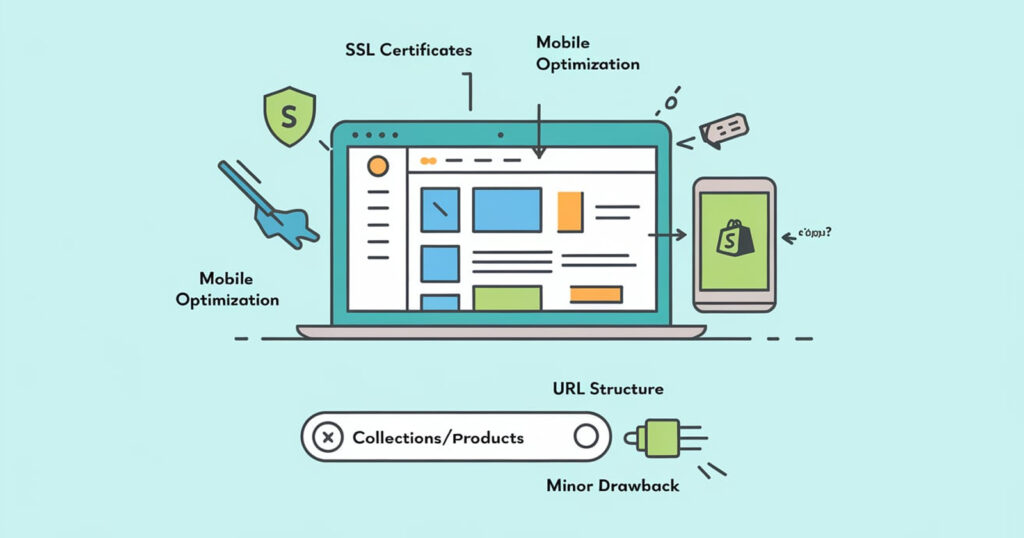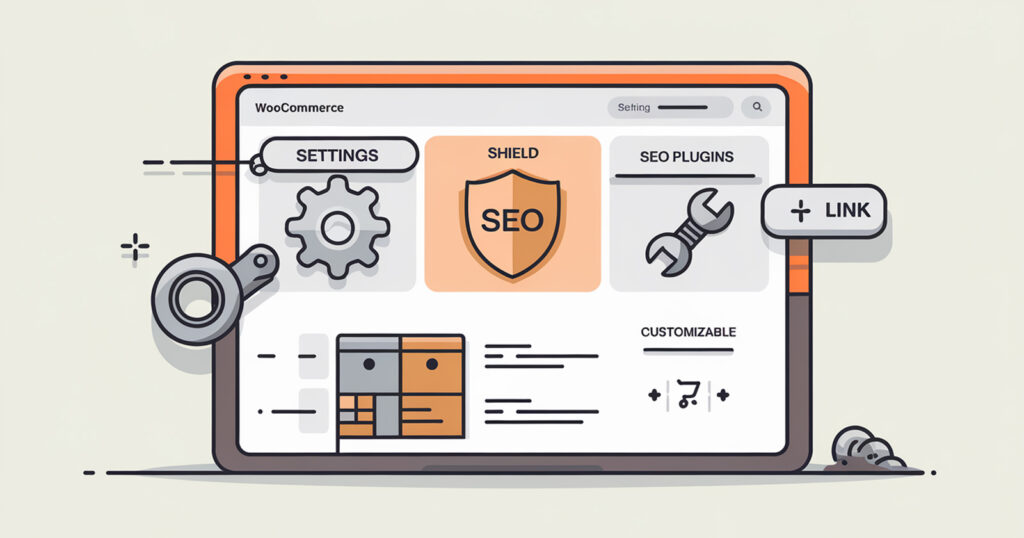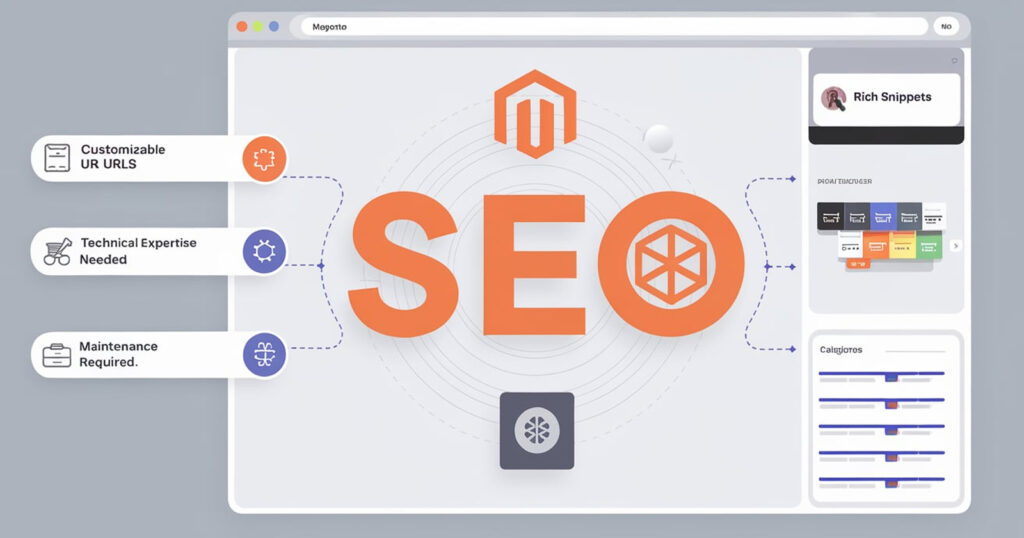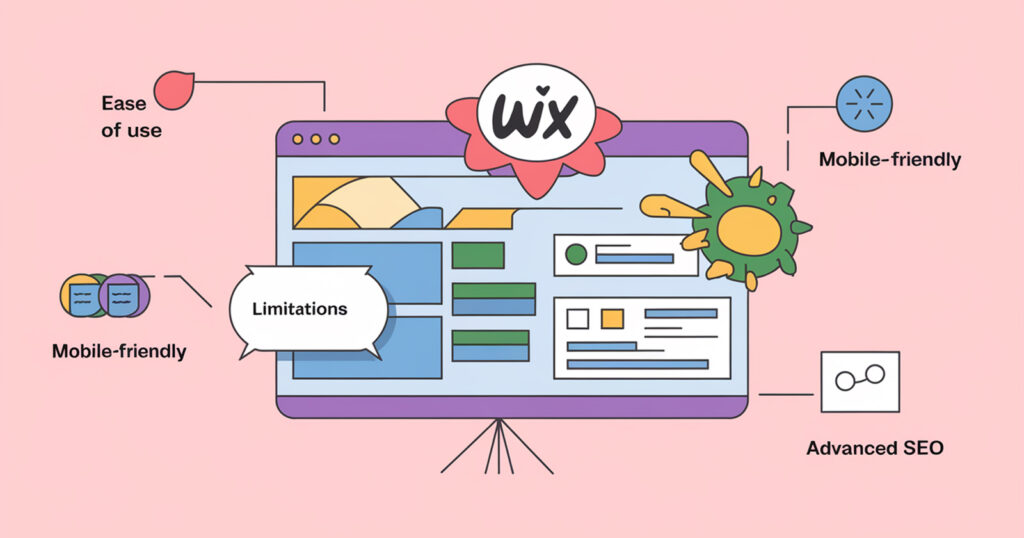
In today’s competitive online marketplace, selecting the right ecommerce platform is one of the most important decisions you’ll make. Not only does it affect your store’s functionality and user experience, but it can also greatly impact your search engine optimization (SEO) efforts. If you’re looking to improve your organic rankings and drive more traffic to your store, choosing the best ecommerce platform for SEO is crucial.
This guide will help you compare various ecommerce platforms, focusing on their SEO capabilities. We’ll explore which ecommerce platform is best for SEO, why some platforms outperform others, and how you can leverage them to maximize your site’s visibility in search engines.
Why Ecommerce SEO Matters
Before diving into the platform comparisons, it’s important to understand why SEO is critical for your ecommerce business.
Search engine optimization helps your online store rank higher in search engine results pages (SERPs), increasing the likelihood that potential customers will find your products. Organic traffic is essential for long-term success because it’s free (unlike paid ads), sustainable, and often more trustworthy to users.
Some SEO factors include:
- Site speed
- Mobile responsiveness
- Clean URL structure
- SSL certificates for secure browsing
- Rich snippets (structured data)
Each ecommerce platform offers different features that influence these factors. Now, let’s take a closer look at some of the best SEO ecommerce platforms and how they perform.
Best Ecommerce Platform for SEO: A Comprehensive Comparison
Here’s a breakdown of some of the most popular ecommerce platforms and how they stack up for SEO success.
1. Shopify: User-Friendly with Solid SEO Features

Strengths:
- Mobile optimization: Shopify offers mobile-responsive themes, ensuring a seamless experience across devices.
- SSL certificates: Built-in SSL helps secure your site and boost rankings.
- App integrations: There are numerous SEO apps and plugins available to help with keyword optimization, metadata, and structured data.
Weaknesses:
- URL structure: Shopify has a rigid URL structure. Every page includes “/collections/” or “/products/,” which isn’t ideal for SEO. While not a dealbreaker, a clean URL structure is preferable for ranking.
Verdict:
Shopify is one of the best SEO ecommerce platforms for small to mid-sized businesses due to its ease of use and availability of SEO tools, but its URL structure could be better for SEO purists.
2. WooCommerce: Flexible and Highly Customizable

Strengths:
- Full control over SEO: WooCommerce is a plugin for WordPress, which means you get all the SEO benefits of WordPress, arguably the best CMS for SEO.
- Plugins and tools: Yoast SEO and other powerful plugins make optimizing product pages, meta descriptions, and schema markup incredibly easy.
- Customizable URLs: WooCommerce gives you full control over your URLs, which is great for optimizing your site’s structure.
Weaknesses:
- Technical setup: Unlike Shopify, WooCommerce requires more technical know-how, especially when it comes to hosting and security. However, for SEO-savvy users, this isn’t a significant barrier.
Verdict:
WooCommerce is often seen as the best ecommerce platform for SEO for businesses looking for complete customization and control. However, it’s better suited for those with some technical expertise.
3. BigCommerce: SEO-Friendly Out of the Box

Strengths:
- Clean URL structure: BigCommerce offers fully customizable, clean URLs, which are excellent for SEO.
- Site speed: Known for fast loading times, which is critical for both user experience and SEO.
- Built-in SEO features: BigCommerce includes SEO-friendly features like 301 redirects, customizable meta tags, and Google AMP out of the box.
Weaknesses:
- Limited theme customization: While the platform offers solid SEO features, theme customization can be restrictive compared to platforms like WooCommerce.
Verdict:
BigCommerce is a great option for businesses looking for an SEO-friendly platform with minimal technical work required. It provides excellent performance out of the box, making it one of the top contenders when considering which ecommerce platform is best for SEO.
4. Magento: Enterprise-Level SEO Capabilities

Strengths:
- Complete SEO control: Magento offers advanced SEO features, from customizable URLs to complete control over meta descriptions and rich snippets.
- Scalable: Magento is highly scalable, making it ideal for large businesses with extensive product catalogs.
- Technical SEO: Magento provides strong technical SEO capabilities, including mobile optimization, fast load times, and excellent site structure.
Weaknesses:
- Technical complexity: Magento requires considerable technical expertise and maintenance, which can be a barrier for small businesses.
Verdict:
Magento is the best SEO ecommerce platform for large, enterprise-level businesses with the resources to manage the platform’s technical demands. Its advanced features give SEO professionals the tools they need for superior optimization.
5. Wix: Beginner-Friendly, but Limited for Advanced SEO

Strengths:
- Ease of use: Wix is incredibly user-friendly, making it a good choice for beginners.
- Mobile-friendly: Most Wix themes are mobile-optimized, a critical factor for SEO.
- Basic SEO tools: Wix offers essential SEO tools like customizable meta tags, alt text for images, and 301 redirects.
Weaknesses:
- Limited SEO features: For more advanced SEO needs (like structured data), Wix falls short compared to platforms like WooCommerce or Magento.
Verdict:
While Wix is beginner-friendly and offers the essentials, it’s not the best ecommerce platform for SEO for businesses with complex or long-term SEO strategies in mind.
Which Ecommerce Platform Is Best for SEO?
When deciding which ecommerce platform is best for SEO, it ultimately depends on your business’s size, goals, and technical expertise.
- For small businesses or those new to ecommerce, Shopify or Wix are excellent starting points due to their user-friendly interfaces and built-in SEO tools.
- For businesses looking for more customization and control, WooCommerce is a top contender, especially if you’re comfortable with WordPress.
- For larger enterprises, Magento and BigCommerce offer the most robust SEO capabilities, but they require more technical expertise and resources.
How to Leverage Your Platform for SEO Success
No matter which platform you choose, here are a few tips to optimize your store for SEO success:
- Optimize product descriptions: Include relevant keywords naturally in your product descriptions, meta titles, and meta descriptions.
- Improve site speed: Use tools like Google’s PageSpeed Insights to ensure your site loads quickly.
- Focus on mobile optimization: Ensure your store is mobile-friendly to cater to mobile shoppers and improve your SEO rankings.
- Implement structured data: Use schema markup to enable rich snippets, making your products stand out in SERPs.
- Use clean URLs: Choose a platform that allows customizable, short URLs without unnecessary subfolders.
Conclusion
Choosing the best ecommerce platform for SEO is a key decision for your online business. Platforms like WooCommerce, BigCommerce, and Magento offer powerful SEO features for businesses with more technical expertise, while Shopify and Wix provide user-friendly solutions for those just starting out. The right choice will depend on your business’s needs, size, and technical capabilities. By selecting the right platform and following best SEO practices, you can drive more organic traffic, improve your rankings, and boost sales.
Frequently Asked Question (FAQs)
The best ecommerce platform for SEO depends on your business needs. WooCommerce offers extensive customization for SEO, BigCommerce provides built-in SEO features, and Shopify is user-friendly but has some URL structure limitations. Magento is ideal for large enterprises with technical expertise, while Wix is better suited for beginners.
SEO is crucial when selecting an ecommerce platform because it directly affects your site’s visibility in search engine results. A platform with good SEO capabilities will help drive organic traffic, which can reduce reliance on paid ads and lead to long-term growth.
Important SEO features to look for include customizable URLs, mobile responsiveness, fast loading speeds, built-in SSL certificates, support for structured data (schema markup), and the ability to optimize meta titles and descriptions.
Shopify offers solid SEO features like mobile optimization, SSL certificates, and various SEO plugins. However, its rigid URL structure can be a drawback. Overall, it’s a great choice for small to mid-sized businesses looking for ease of use with decent SEO capabilities.
WooCommerce, built on WordPress, gives you full control over SEO elements such as URLs, meta tags, product descriptions, and structured data. With plugins like Yoast SEO, it provides advanced SEO features that make it one of the most flexible and powerful platforms for SEO.
Yes, you can migrate your online store to a more SEO-friendly platform. However, it’s important to plan carefully and use proper redirects (301s) to ensure that you don’t lose existing search rankings during the migration.
Magento is an excellent platform for businesses with large product catalogs and technical resources, but it can be overkill for small businesses. If you run a smaller ecommerce store, platforms like WooCommerce or Shopify may offer sufficient SEO features with less complexity.
